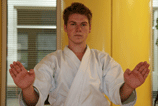|
|

Please email us at information@shidokanint.ca
if you are interested in
training with us or would like to try a class.

Beginner classes are given at two locations:
Loisirs Sportifs
Côte-des-Neiges (LSCDN)
4880 Avenue Van Horne
(Metro: Plamondon, Buses: 124 and 161)
(514) 342-9988
| 8+ yrs |
Saturday |
4:15 - 5:30 PM |
Starts January 24 |
Please contact us
for prices
|
|
|
|
|
|
Please also bring to the first class:
- an envelope with your name, address, telephone number, date
of birth, email and age (and school, if you are a student)
- a small photo of you
- an additional $15 for the Japan Karate Association
membership fee
|
|
Concordia
University - Le Gym, EV Building
(S2.206)
1515 Rue
Sainte-Catherine
Ouest (Metro: Guy-Concordia, Buses: 165,
166,
465)
(514) 848-2424, ext. 3860
Please visit the Concordia
Le Gym website to register.
|
| 18+ yrs |
Monday and
Wednesday |
6:00 - 7:30 PM |
Starts January 12 |
Concordia Students: $130
Everyone else: $145
|
|
|
| For students with prior karate experience:
please contact us to discuss which classes you should attend. |

As a beginner, all you will need to bring to class are some comfortable clothes
(a T-shirt and some jogging pants are suggested). Also, we do not wear jewelry
or watches in karate (they can cause injuries when doing partner work), so you
should leave your valuables at home when you come to class.

Karate-do (meaning "way of empty hand") is a martial art involving a
variety of techniques, such as strikes, punches, blocks and kicks. It is divided
into three parts: basics, kata and kumite. Basics teach the student the proper
way to block, punch, kick, etc. Kata is a pre-determined sequence of movements
simulating attacks and blocks against multiple opponents. Kumite puts the
techniques you learn into practice and is done with a partner. As students
progress, they go up levels, earning
different colours of belts.
Combining these aspects creates a highly dynamic and complete exercise, making
use of a large number of muscles, conditioning the cardiovascular system and
developing agility, stamina, coordination, speed and self-confidence. In
addition to learning these techniques, the karateka (karate practitioner) will
develop self-discipline and will be introduced to some Japanese traditions,
culture and language.

Karate is comprised of a wide range of styles, each differing in stance, arm
and/or leg positions. The Japan Karate Association was formed in May 1948, with
Master Gichin Funakoshi as chief instructor. Since then the practice of JKA
karate has become widespread providing its members with worldwide technical
standards and certification. JKA students around the world strive to develop character and self-control along with the
technical expertise associated with the JKA.
Our style of karate emphasizes control, focus, proper timing and body shifting
while maintaining posture and strong basics and is suitable for karate students
of all ages.
|
|
|
|

